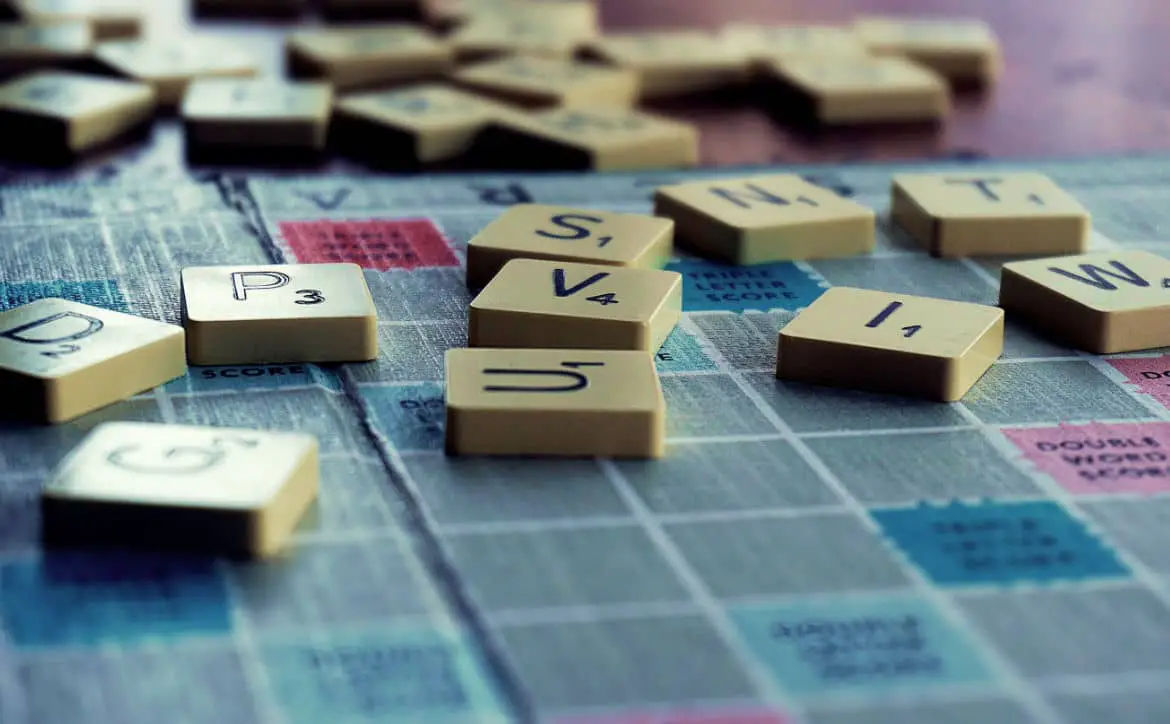Scrabble is one game that takes a lot of practice, memorization, patience, and strategy to win consistently. This statement may sound like an exaggeration considering the simplicity of the game’s overall premise and mechanics, but there’s a lot of truth to it.
Estimated reading time: 7 minutes
While Scrabble may not be as complex as today’s player-versus-player (PvP) video games, it is still a PvP game at its core. Despite its straightforward mechanics, the game’s actual difficulty depends on the knowledge and strategies of your opponent.
If you’re like the average Scrabble player, you have probably competed in one or two games thinking it was easy. The next thing you know, you’re losing games consistently against players with high-level IQ or sneaky strategies.
Like any game ever invented, Scrabble has patterns one can look out for regardless of whether it’s a video or board game. The player with the keenest understanding of the game’s mechanics and patterns will almost always win.
Many people—especially amateur players—assume good Scrabble contenders have a high IQ and broad vocabulary. Contrary to their belief, these traits will only take a player so far. You would be amazed to know that, in some cases, a strong vocabulary and above-average intellect could cause a player to lose. Players with these characteristics are more likely to make mistakes due to overthinking and playing too safely.
If you want to avoid falling into the same pit as these amateur players and win consistently, this article is for you. This article will uncover all the common mistakes Scrabble players make that cost them games.
Tunnel-Visioning To Play Specific Words
For those unfamiliar with the word, “tunnel-vision” came out first in first-person shooter games. It depicts a scenario where players focus their sights too much on their scope that they fail to see what is around them. The player’s lack of awareness of their surroundings ultimately leaves them open for other players to attack their blind spots.
However, that depiction only describes a specific and literal example of tunnel vision. Essentially, tunnel-visioning focuses too much on a single target or objective and completely ignores one’s surroundings. Despite where players coined the term, tunnel-vision does not exclusively occur in first-person shooter games.
People can tunnel-vision in multiplayer online battle arena (MOBA) games, single-player games, and even board games. A prime example of tunnel visioning in Scrabble is when players hold their tiles too long for a specific word.
Rookie Scrabble players tunnel-vision when they hold on to letters while waiting for specific letters to appear. While that sounds like a good strategy for forming big words, it severely limits the players’ options for win conditions. That means while waiting for specific letters; opponents can gather more points with shorter words and exploit bonus squares.
Contrary to what most amateur players believe, long words only sometimes win the game. You’re more likely to succeed with shorter words and hooks, provided you know the proper board placements. It’s why players who have memorized two and three-letter words have a higher chance of winning than those with a vast vocabulary.
Lack of Awareness of the State of the Board
Similar to the gameplay mechanics of other popular board games like chess and checkers, Scrabble demands attention to everything happening on the board. Lack of constant awareness of the state of the board gives your opponent the advantage and allows them to incorporate sneaky strategies.
To better understand why board awareness is essential, here are two of the most commonly used sneaky Scrabble strategies.
1. The two- and three-letter word strategy
For obvious reasons, the two- and three-letter word strategy is the easiest to spot. As the name implies, it utilizes words from the two and three-letter Scrabble words list. Advanced players overuse this strategy because it’s a proactive, low-risk, high-reward strategy that only requires memorization.
Because of how short these words are, players will always have letter combinations to utilize every turn. The small size of these words also enables the player to sneak them into tight spaces on the board. Finally, the most significant advantage of this strategy is the ability to abuse as many bonus squares as possible with minimal effort.
If you see an opponent using this strategy, the only viable way to counter it is by using the same approach against them. It will boil down to which player gets the most hooks and bonus squares.
2. The hooks strategy
Hooks are letters you can attach to the beginning or end of existing words to generate new ones and siphon points. There are two kinds of hooks strategies players can exploit in a game of Scrabble. These are pluralizing words and coming up with entirely new terms.
The hooks strategy is reactive by nature and requires words from a player’s opponent to siphon points off them. For this reason, you must be careful with what words you put down and where you position them. Ideally, you want to abuse as many bonus squares as possible while blocking your opponent from playing off your words.
A great way to counter this strategy is to use word unscramblers like Unscrambled Words to find more complex words to disrupt your opponent. When you use word finders, you have more letter combinations at your disposal. It means instead of your opponents making hook attempts at your words; you can turn the tables and play hooks on their words.

Failing to Trade Efficiently
Every game that involves playing against other players will always have trades in some way or form. Whenever you make a play, expect your opponent to have a move that either counters or disrupts it.
There is never any instance in games where a perfectly laid game plan’s execution goes smoothly. Trades happen in every multiplayer game, from video games to board games. The key to winning in any of these games is to know how to trade efficiently.
Again, in Scrabble, there is always the risk of your opponent creating advantages from the words you play. The trick to staying on top is to mitigate these risks through the trade decisions you make. The problem is most players either fail to create good trade opportunities or fail to capitalize on good trade opportunities created by their opponents.
For example, you play the word “host,” and your opponent uses an “s” tile to piggyback on your word to create “hosts.” That move is an example of a trade going in your opponent’s favor.
Most people will give up on this trade because they believe they have already lost it and move on to the next word. However, you can force the trade back into your favor by counter-hooking with the “g” tile to create the word “ghosts.” That is a prime example of turning bad trades into good ones.
Creating good trade opportunities for yourself and generating bad trade opportunities for your opponent is the key to winning any game, especially in Scrabble. Mastering the art of good trades in Scrabble takes hours of practice and a good grasp of hook words.
Never Lose Another Scrabble Game Again
While many people believe that Scrabble is a simple and fun crossword-like board game, there is more to it than that. In actuality, Scrabble is a game that requires critical thinking, game sense, practice, and some memorization.
It does not mean winning in Scrabble requires a strong vocabulary or high-level IQ. Instead, Scrabble requires a player to have keen board awareness, knowledge of its patterns and strategies, and good decision-making during trades. By understanding rookie players’ common mistakes, you can learn from them and make better decisions when you play again.
Buy the Scrabble board game here and the video game here.
What do you think of these rookie Scrabble mistakes? Have you made them? Do you play Scrabble with your family at Christmas? Please share your thoughts on any of the social media pages listed below. You can also comment on our MeWe page by joining the MeWe social network. Be sure to subscribe to our RUMBLE channel as well!










